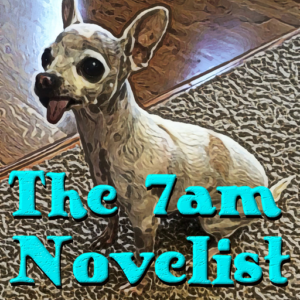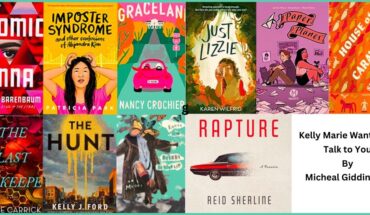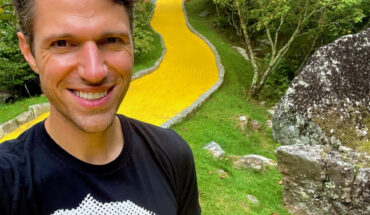 I’m not normally a morning person, but Michelle Hoover’s free webinar series and podcast, The 7am Novelist, just might convert me. Every morning at 7am, for 50 days, Hoover inspires us to get writing by discussing novel writing craft with one or two guests for thirty minutes. Hoover is a published author, writing teacher, and co-founder of GrubStreet’s Novel Incubator program. Her guests are writers who span genres and career stages, and include both Incubator graduates and authors of multiple award-winning and bestselling books. These are some of my highlights so far.
I’m not normally a morning person, but Michelle Hoover’s free webinar series and podcast, The 7am Novelist, just might convert me. Every morning at 7am, for 50 days, Hoover inspires us to get writing by discussing novel writing craft with one or two guests for thirty minutes. Hoover is a published author, writing teacher, and co-founder of GrubStreet’s Novel Incubator program. Her guests are writers who span genres and career stages, and include both Incubator graduates and authors of multiple award-winning and bestselling books. These are some of my highlights so far.
The first week’s episodes focused on the fundamentals of the novel writing process. How do you get started? How do you set goals? How do you stay motivated? Hoover’s guests discussed the relative merits of plotting vs. pantsing, often rejecting that binary along the way. For example, Jane Roper described her process as “the pantsing version of plotting.” She creates high-level plans on a whiteboard, identifying key beats in each act of her novel – but she doesn’t do any of this until she’s already written a draft of the first act, enough to get to know the characters and the setting. Roper mentioned E.L. Doctorow’s line about writing being like driving at night in the fog: “You can only see as far as your headlights, but you can make the whole trip that way.”
Several writers shared specific techniques they use to keep making progress. One of my favorites was Belle Brett’s strategy of leaving a scene unfinished at the end of each day, so it will be easier for the writer to jump back in the next day. More generally, I appreciated the advice from several authors about taking yourself seriously as a writer, and treating writing as a job, not as something you only do when you’re in the right mood or when the circumstances are perfect. Hoover encourages us to follow Goethe’s advice: “Do not hurry, do not rest.”
In the second week, Hoover and her guests examined aspects of character-building. Steve Almond and Kate Racculia discussed the implications of a main character as observer vs. participant. Almond misses the traditional narrator as perfected by Jane Austen. “We’ve turned our back on storytelling and narrative voice,” he says, noting the influence of visual storytelling from TV and movies on writing. (Almond’s 2013 essay “Once Upon a Time, there was a Person who Said ‘Once Upon a Time’,” explores this premise in more detail.)
A discussion with Margot Livesey and Courtney Maum delved into the attitude of a character, a concept that originated in Livesey’s book of craft essays, The Hidden Machinery. A character’s attitude includes things like how they walk into a room or how they treat others, which Livesey finds much more useful to consider than a character’s appearance. “We’re not looking for an Identikit police description,” she says. “We’re not trying to arrest them.” Maum likes to think about what a character has in their wallet, purse or car, and what story a character’s relatives are always telling about them.
Another episode looked at supporting characters. Hoover reminded us of the tricky balancing act supporting characters must perform. On one hand, they must have their own intentions and their own arcs. (She mentioned Adam Sexton’s requirement that a secondary character be “round” or, as Aristotle wrote, “consistently inconsistent.”) At the same time, a supporting character shouldn’t usurp the spotlight from the main character—unless, as guest Nancy Crochiere did when developing her novel, you’re willing to promote them to a POV character.
A session on stakes with Maurice Ruffin and Hank Phillipi Ryan brought the second week to a close. For Ryan, who writes thrillers, the stakes are the whole book. What bad thing will happen if the character doesn’t get what they want? As Hoover points out, the consequences have to be both emotional and concrete – it can’t just be “they’ll be sad.” Ruffin says the stakes give the character a reason to break the rules of society, to take risks, to make sacrifices. The stakes have to be high enough for the character and the reader to care.
Thirty minutes goes by really quickly, and sometimes it seems like the 7am Novelist conversations are over just when they’re getting most interesting. The format also doesn’t leave a lot of time for interaction with the live audience. But for me, the half-hour limit is part of the appeal. It makes watching or listening to an episode easy to fit into my schedule, and leaves me wanting more.
Regardless of the day’s particular topic, Hoover and her guests are there every morning for 50 days to support and encourage writers, sending us back to our desks each day with renewed enthusiasm. And if life intervenes, and not every day is a success, I hear her voice reminding me: Do not hurry, do not rest.
The 7am Novelist launched October 4, and is running for 50 episodes, through November 22, with new writing topics and guests each week. Find it on major podcasting services, including Apple and Spotify, as well as on Hoover’s blog, 7amnovelist.substack.com. And did I mention it’s FREE!
Michelle Hoover’s most recent novel is Bottomland.
Belle Brett is the author of Gina in the Floating World.
Jane Roper’s most recent book is Double Time: How I Survived—and Mostly Thrived—Through the First Three Years of Mothering Twins.
Steve Almond’s most recent novel is All the Secrets of the World.
Kate Racculia’s latest novel is Tuesday Mooney Talks to Ghosts.
Margot Livesey’s most recent novel is The Boy in the Field.
Courtney Maum’s latest novel is The Year of the Horses.
Nancy Crochiere’s debut novel, Graceland, is due out in May 2023.
Maurice Ruffin’s most recent book is The Ones Who Don’t Say They Love You.
Hank Phillipi Ryan’s latest thriller, The House Guest, is due out in February 2023.




2 comments